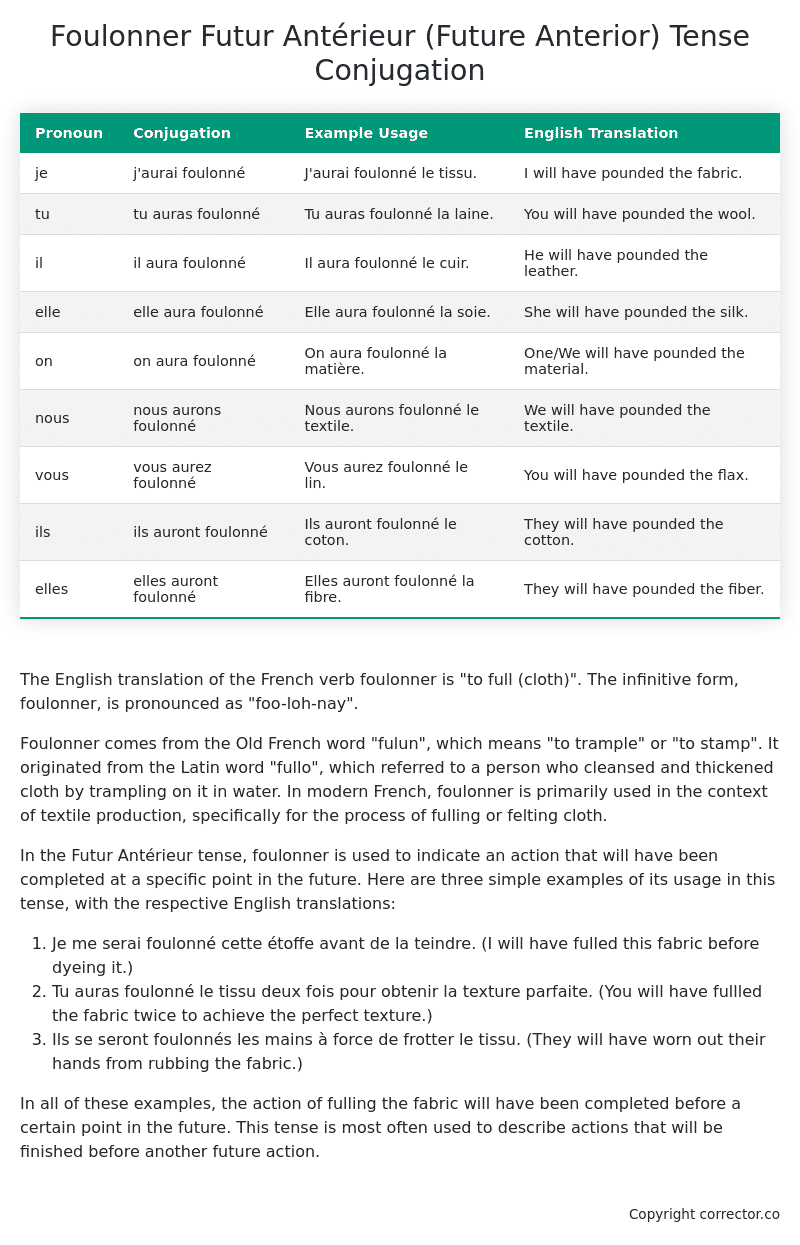Futur Antérieur (Future Anterior) Tense Conjugation of the French Verb foulonner
Introduction to the verb foulonner
The English translation of the French verb foulonner is “to full (cloth)”. The infinitive form, foulonner, is pronounced as “foo-loh-nay”.
Foulonner comes from the Old French word “fulun”, which means “to trample” or “to stamp”. It originated from the Latin word “fullo”, which referred to a person who cleansed and thickened cloth by trampling on it in water. In modern French, foulonner is primarily used in the context of textile production, specifically for the process of fulling or felting cloth.
In the Futur Antérieur tense, foulonner is used to indicate an action that will have been completed at a specific point in the future. Here are three simple examples of its usage in this tense, with the respective English translations:
- Je me serai foulonné cette étoffe avant de la teindre. (I will have fulled this fabric before dyeing it.)
- Tu auras foulonné le tissu deux fois pour obtenir la texture parfaite. (You will have fullled the fabric twice to achieve the perfect texture.)
- Ils se seront foulonnés les mains à force de frotter le tissu. (They will have worn out their hands from rubbing the fabric.)
In all of these examples, the action of fulling the fabric will have been completed before a certain point in the future. This tense is most often used to describe actions that will be finished before another future action.
Table of the Futur Antérieur (Future Anterior) Tense Conjugation of foulonner
| Pronoun | Conjugation | Example Usage | English Translation |
|---|---|---|---|
| je | j’aurai foulonné | J’aurai foulonné le tissu. | I will have pounded the fabric. |
| tu | tu auras foulonné | Tu auras foulonné la laine. | You will have pounded the wool. |
| il | il aura foulonné | Il aura foulonné le cuir. | He will have pounded the leather. |
| elle | elle aura foulonné | Elle aura foulonné la soie. | She will have pounded the silk. |
| on | on aura foulonné | On aura foulonné la matière. | One/We will have pounded the material. |
| nous | nous aurons foulonné | Nous aurons foulonné le textile. | We will have pounded the textile. |
| vous | vous aurez foulonné | Vous aurez foulonné le lin. | You will have pounded the flax. |
| ils | ils auront foulonné | Ils auront foulonné le coton. | They will have pounded the cotton. |
| elles | elles auront foulonné | Elles auront foulonné la fibre. | They will have pounded the fiber. |
Other Conjugations for Foulonner.
Le Present (Present Tense) Conjugation of the French Verb foulonner
Imparfait (Imperfect) Tense Conjugation of the French Verb foulonner
Passé Simple (Simple Past) Tense Conjugation of the French Verb foulonner
Passé Composé (Present Perfect) Tense Conjugation of the French Verb foulonner
Futur Simple (Simple Future) Tense Conjugation of the French Verb foulonner
Futur Proche (Near Future) Tense Conjugation of the French Verb foulonner
Plus-que-parfait (Pluperfect) Tense Conjugation of the French Verb foulonner
Passé Antérieur (Past Anterior) Tense Conjugation of the French Verb foulonner
Futur Antérieur (Future Anterior) Tense Conjugation of the French Verb foulonner (this article)
Subjonctif Présent (Subjunctive Present) Tense Conjugation of the French Verb foulonner
Subjonctif Passé (Subjunctive Past) Tense Conjugation of the French Verb foulonner
Subjonctif Imparfait (Subjunctive Imperfect) Tense Conjugation of the French Verb foulonner
Subjonctif Plus-que-parfait (Subjunctive Pluperfect) Tense Conjugation of the French Verb foulonner
Conditionnel Présent (Conditional Present) Tense Conjugation of the French Verb foulonner
Conditionnel Passé (Conditional Past) Tense Conjugation of the French Verb foulonner
L’impératif Présent (Imperative Present) Tense Conjugation of the French Verb foulonner
L’infinitif Présent (Infinitive Present) Tense Conjugation of the French Verb foulonner
Struggling with French verbs or the language in general? Why not use our free French Grammar Checker – no registration required!
Get a FREE Download Study Sheet of this Conjugation 🔥
Simply right click the image below, click “save image” and get your free reference for the foulonner Futur Antérieur tense conjugation!

Foulonner – About the French Futur Antérieur (Future Anterior) Tense
Construction
Common Everyday Usage Patterns
Interactions with Other Tenses
For example
Summary
I hope you enjoyed this article on the verb foulonner. Still in a learning mood? Check out another TOTALLY random French verb conjugation!


